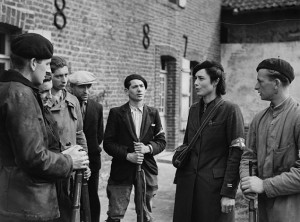A few months ago, Covenant Seminary Professor Dan Doriani wrote a post at Gospel Coalition entitled The Power—and Danger—in Luther’s Concept of Work. It’s a good piece, and the author has a good understanding of the importance of Luther’s doctrine, including love and service to the neighbor.
But at the end, he moves to what he considers the “Danger” of Luther’s teaching. Briefly, he says that Luther’s understanding of God’s calling sanctifies the status quo. If you are in a lowly “dehumanizing” job, if you think of it as a calling from God, then you would never leave it.
It took Calvin, he says, to perfect Luther’s doctrine of vocation.
Read the entire post. I quote part of it after the jump. Then I try to answer the criticisms.
From Dan Doriani, The Power—and Danger—in Luther’s Concept of Work, Gospel Coalition:
Since Luther is so influential, we ought to assess his thought, beginning with his desire to dignify all labor. When he insisted that God summons everyone to a “station,” it means all can serve God and neighbor where they are. This is a great consolation to all who feel trapped by their work. And our restless age needs this exhortation to labor in our place, instead of constantly asking “what’s next?”
Yet Luther’s consolation has a cost. If every legitimate task is a divine calling, it may be imperative for workers to remain where they are. But if all work is a divine calling, how can anyone seek a new position or try to reform abuses in the workplace? If we follow Luther too rigidly, the distance between what we do today and what we might do tomorrow evaporates and the motive to reform the conditions of labor dwindles.
For Luther 1 Corinthians 7:20 was an essential text: “Each one should remain in the condition in which he was called.” But this only covers half of the message. Yes, Paul says a slave should “remain in the condition in which he was called,” but he also says, “If you can gain your freedom, do so” (1 Cor. 7:23). “Stay where you are” is no absolute principle. Further, 1 Corinthians 7 instructs slaves, not all workers, and slaves were especially immobile. Though this passage helps Christians endure entrapment in difficult situations, it doesn’t instruct us to stay put no matter what.
Luther’s treatise “Whether Soldiers Too Can Be Saved” illumines the point. He uses the terms “office,” “work,” “calling,” “occupation,” “work,” and “position” interchangeably, as if they are the same thing. Regrettably, this use obscures the difference between work and calling. There is a difference between a temporary summons to war and a life of soldiering. There is occupation without vocation. One can earn bread as a cashier, cook, nanny, or salesperson without hearing a call to that life. A job pays the bills; our life’s work fits our gifts, interests, and training. . . .
The summer before I went to college, I worked at a milk-processing plant. One day the boss ordered me to tend the machine that made boxes for specialty cheeses. I mastered the task in an hour. The rest of the day I wondered about the woman who’d tended the machine for 15 years.
Is it right to ask humans to tend machines 40 hours per week, in tasks so simple one can master them in hour? But if every job is a call, how can anyone challenge dehumanizing work patterns? At worst, Luther’s concepts let exploitative leaders command pacified people to do their duty by following orders, whatever they may be. Clearly, we need the principle of semper reformanda here. Luther’s teaching on work made a great contribution but, like every reformer, he needed others to consolidate and refine his insights.
That fell to John Calvin.
Calvin saw that sin distorts the structures of work. Like Luther he said God placed people in permanent callings, yet he could still question the social order. For example, Calvin urged citizens to obey “arrogant kings,” but he added that lesser magistrates have a duty “to withstand kings who . . . violently assault” their own people. Indeed if they “wink at” violent kings, they are guilty of “nefarious perfidy.” Similarly, Luther condemned the behavior of abusive masters, but Calvin struggled with the institution of slavery itself. In his sermon on Ephesians 6:5–9 he observes that masters had “excessive authority . . . over their slaves” and proposes that God allowed “this state of affairs . . . because of man’s wickedness.” In itself, slavery is “totally against all the order of nature”; it exists because Adam “perverted the order of nature.” So Calvin advocates reform of social structures.
First of all, when Luther told people to stay in their callings, he meant primarily that, contrary to the dominant teachings of the day, they do not need to pursue a church “vocation”–being a priest, a monk, or a nun–in order to live a life more pleasing to God.
Second, when Luther talked about vocation, he was not primarily referring, as is the tendency today, to the various ways we make a living. He taught that we have multiple callings in the three “estates” that God designed for human life: the church, the state, and the household. The latter is the family–with the vocations of husband and wife, father and mother, son and daughter, etc.–plus the way the family makes its living. So “work” is subsumed with “family,” as was true in the late medieval economy: Whether you were the ruler of the land or a peasant farmer, a noble or a cobbler, your workplace was your home, and your occupation was connected to your family.
The text Prof. Doriani cites, 1 Corinthians 7:20, refers specifically to marriage. Luther does say that married men must not say, “I didn’t really have a calling for marriage,” as an excuse to leave their wives. If you are married, God called you to that marriage.
Clearly, Luther believed that God can call someone to one vocation, and then later call that person to another vocation. Luther himself was a celibate monk, until he married Katherine von Bora. His vocation changed. More broadly, within the family, someone with the calling of a child may then grow up and receive the calling of a spouse and then the calling of a parent.
The late medieval economy of Luther’s day offered very few prospects of changing one’s career. Pretty much the only feasible way to do that is to enter the vocations of the Church, a celibate world free of family restrictions, in which a peasant could become a monk, a priest, an abbot, a bishop, and even the Pope. But Luther’s doctrine of vocation would soon make possible other kinds of social mobility. Luther’s own father was a peasant who left the farm to work in the mines, then bought a smelter to process the ore, then multiple smelters, rising in society to become a middle class townsman who served on the City Council.
By Calvin’s time, the social mobility and economic opportunity opened up by the Reformation was in full swing. But Lutherans participated in that too. Luther’s doctrine was no hindrance to the burgeoning middle class in Germany and Scandinavia.
As for Luther’s ideas sanctifying the status quo, that notion keeps coming up in discussions of various facets of Luther’s thought. Certainly he was allied with various German princes and opposed the anarchy of the Peasants’ Rebellion. But Luther was the one who rebelled against the two most powerful authorities of his day: the Pope and the Emperor.
This rebellion turned into an armed struggle immediately after Luther’s death, in the Smalkald War, which eventually morphed into the Thirty Year’s War. Lutherans defended their rebellion against established authority in much the same terms that Prof. Doriani credits to Calvin.
As for the vocation of citizenship, Lutherans, far from feeling that God had irrevocably called them to the particular state or province they were born in, had no qualms about immigrating. Confessional Lutherans abandoned their allegiances when they interfered with their faith, travelling to Africa, South America, Australia, and the United States, setting up church bodies such as the Lutheran Church Missouri Synod and others that are still faithful to this day.
The one thing, though, that really bothers me in Prof. Doriani’s post, is its attitude towards that woman who had been working in that “dehumanizing” factory for 15 years.
That milk-processing factory was a means by which God provides milk to children–part of the “daily bread” that He provides to all of us. The purpose of work, again, is for the neighbor, not the self. Young Doriani would be called to serve as a businessman, as a college administrator, as a pastor, as a professor. This woman stays at that milk factory. This is reason to honor her. Not to minimize what she does.
Luther writes about vocation in terms of bearing the cross, of sacrifice, of self-denial. When you love and serve your neighbor, you deny yourself out of love for that person. Vocation is not about self-fulfillment, or enjoying your work, or not feeling drudgery.
Some work is less pleasant than others. That work is often despised by the world, in favor of more prestigious and better-paying positions. Often, those despised jobs–trash collecting, cleaning hotel rooms, tending to sewers– involves a level of love and service to the neighbor that far exceeds the socially prized work of, say, Hollywood actors and professional athletes.
In fact, I might argue that the more praised positions can be more “dehumanizing” than the more lowly ones. That is, positions that bring affluence and prestige–including, I can say from personal experience, academia–can take a toll on the “humanness” of those in the position, as well as those under their authority or those their position is supposed to serve.
Luther’s doctrine of vocation does not prevent the woman in the milk factory from taking another job or working to improve conditions at the plant or taking night courses to help her move up in the world. But it does or should prevent the rest of us from looking down on her or her work.
UPDATE: It’s important to realize that vocation is in the here-and-now. That is, Christians always have a calling, right here and right now. Christians are never without a vocation.
Vocation isn’t something in the future, though you might be preparing for your career or looking forward to getting married and having children, which you may or may not be called to, later. But vocation is Luther’s doctrine of the Christian life in the world. So the tasks and relationships that God has given you right now are part of your vocation. They may have nothing to do with how you make your living, but in these you will find the neighbors whom God wants you to love and to serve.
There is nothing static about this. Your neighbors change, so, of course, your vocations change. But vocation is where you live out your faith, where your faith bears fruit and becomes active in love. So, yes, if you are putting yourself through college by flipping hamburgers en route to law school, it isn’t that you will find your calling when you get hired by a big law firm. Flipping the hamburgers is also your calling while that is the work you have. And if you are unemployed, you have vocations as a member of your family (not just if you are married with children but the family you were born into, your parents, cousins, nieces & nephews, etc.), a member of your church, and a member of your community, nation, and culture.



